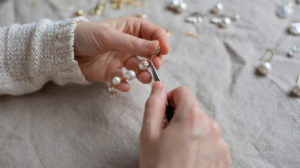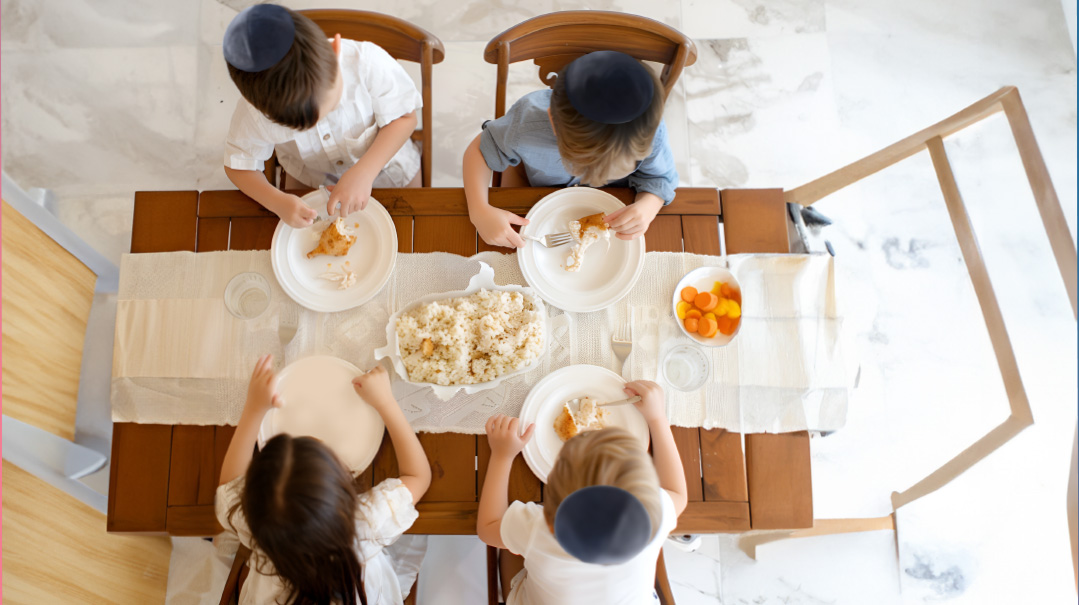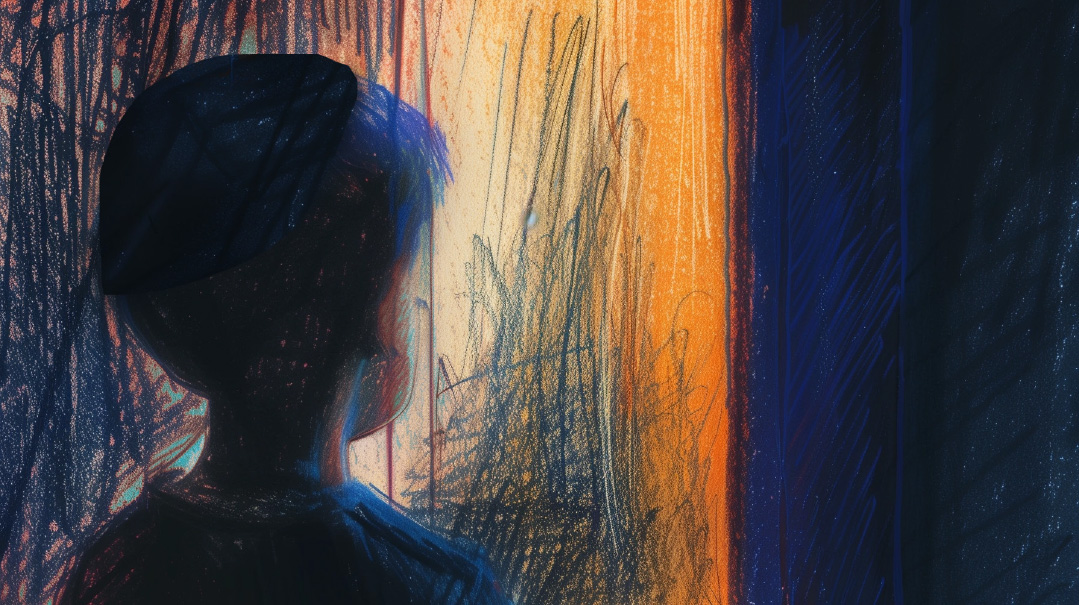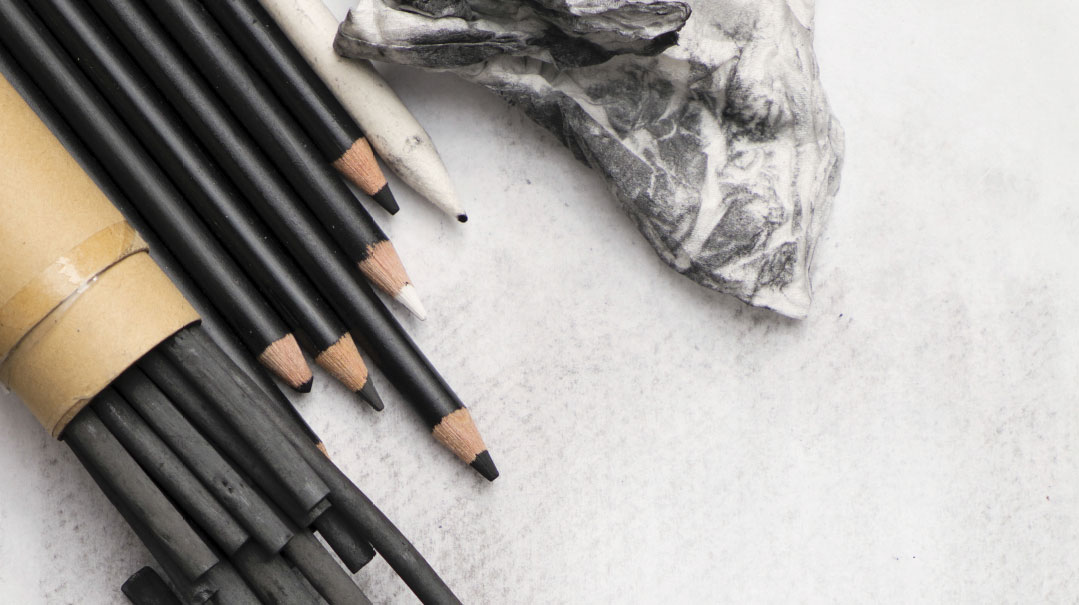The Color of Giving

A painter she isn’t but once upon a happier time Nina fancied herself a poet. Today she writes with her finger in the air above her bed. Her words are vaporous passing almost before they are birthed

F rom her bed she can see a sliver of sky. It’s pale blue today just shades off yesterday’s washed-out white. The color makes all the difference to her mood. Or maybe it is her mood that makes all the difference to the color?
If she could paint Nina would coax shining streaks of life from dull blocks of watercolor. She would wield a magic wand dripping sunset shades and she would run color onto every surface she could reach. The bed linen. The IV pole. The wall.
Nina dreams in technicolor. When she is sleeping life tastes of rainbows. When she wakes up there is only white and gray.
Of course there are also the mood charts Sarah makes her enter into the iPad every evening. They are mustard yellow and dull red and flashed through with white teeth gnashed or grinning weirdly but the colors are computerized and lifeless. Nina hates the charts. Sometimes she thinks they are more depressing than the illness.
But today will be a smiley day.
No reason why except for the blue in the patch of sky. A miracle in her bloodstream the cohort of meds balancing in blissful harmony for once. Which means that for one blessed beautiful day she can live with lightness in her heart. End her evening with a decisive click on the icon with a small smile two wide-open eyes no teeth. Her favorite.

The aggravating part of it all is that there is no knowing what tomorrow will bring. No holding onto this brush with joy — no not joy but something like contentment at least. Just encountering the scent of paradise and wondering how long it will last this time.
There was a time when life was sweet.
When a midnight wail made me sigh
And morning cast brilliant glow when I rubbed my eyes
And I lived with a prism of emotion
And didn’t realize that
simply feeling
was beautiful.
A painter she isn’t but once upon a happier time Nina fancied herself a poet. Today she writes with her finger in the air above her bed. Her words are vaporous passing almost before they are birthed.
She wakes up again before she realizes she has fallen asleep. How she can sleep when she wants to catch the day between her fingers she doesn’t know but the medications make her sleepy. Side effects. The least of them.
Shaya comes with breakfast and a smile in his eyes. He is one of the 36 hidden tzaddikim to handle all this she decides. Last year’s nightmare of diagnosis and treatment and nights in a plastic hospital chair were one thing; none of them had bargained for the side effects of her medication turning into a tunnel of depression and cocktail of psychiatric medication constantly balanced against treatment drugs and pain meds.
The toasted sandwich creamy with melted cheese catches her attention first. Her mouth waters guiltily at the brown pale yellow; today they are the colors of life and health and appetite. She forces herself to say hello before reaching out. He laughs and brings her a cup to wash.
“Eat something we’ll talk soon ” he commands. She’s too grateful to care about the wary glint in his eye the one that tells her how hard it must be for him to walk in each morning never knowing just what he might find.
She eats and listens with half an ear as he runs through the news he’s obviously prepared en route to the hospital. The downstairs tenants are moving, Esty drew her another picture, the Rosh Yeshivah gave a brachah, and of course, the kollel are all davening. Half her mind wants to quip that none of this news is new; he could just as easily call it “olds” and send in a recorded playback, but she can’t bring herself to make jokes. Even today.
There are only crumbs left on the plate and she still hasn’t said a single word.
“And… how are you?” he asks, and the hesitation says too much. She shrugs. If she opens her mouth to voice the potential expanding her consciousness, it might dissipate. Better keep it safely inside.
“It’s all right. Same, same, you know.” But even the flippant tone is a change from the worst days, and she notices his eyes light briefly.
“It won’t be forever, you know.”
“Today is all right,” she repeats, because the familiar but it feels like forever mantra has no place in a world where the sky is blue.
“Today.”
He holds out a single sheet of white paper. Esty’s offering of the day. Esty’s four-year-old hand wobbled on the stick figures, but there is nothing more precious than seeing the sunshiny shadow of her little one. Does her child even remember she has a mother, somewhere in a hospital ward? Or is it too late, has Tzippy secured that sacred spot in her daughter’s life?
For the thousandth time, Nina wishes she could feel grateful to her sister, but there is no space around the burn in her heart.
Just before Shaya leaves, he gives her the messages. Letters, text messages, e-mail printouts. Messages are her last threads of connection with the world on wheels, long moved on without her. He leaves the worst for last, and she knows by the gap between sentences that lasts too long, that it is from Tzippy.
“She really wants to visit, Nina,” Shaya says. His hand edges for the door handle.
She draws in a sigh but lets the air out quietly. “What do you want me to do?”
“I’m not saying anything. Just passing on the message. But she cares, Nina, that’s all.”
It’s ridiculous, but all she can think of is the pale pink of Tzippy’s lipstick juxtaposed against the trusting blue of Esty’s eyes. “I know. I don’t want visitors.”
He looks torn. She is giving him another thing to worry about, and she hates that. “You want me to tell her?”
She sighs and rips the words from inside her. The sky is blue today. Remember.
“Nah, don’t. Not today. Who knows — maybe I’ll feel up to her visit soon?”
We used to sniff the moonlight together
Dance in the breeze beneath skies of rose
Puff dandelions onto snatching winds
And when the sun set on our lives, it was I who held her tight
The world couldn’t cave in on her that way
Only on us
Nina lay still, images dancing across her eyelids.
Nina was the oldest. Tzippy, the youngest. The boys in between, all noise and hustle and leibedig banter. Ta was strong and silent, Ma fragile as a fraying thread, never having recovered from the illnesses of her younger years. Their family was close and comforting, but a special bond had forged between the sisters, a magic force no one could touch.
Cutting out paper dolls for Tzippy. Taking Tzippy shopping. For clothes, shoes, accessories, school supplies. Sending packages to camp. Phone calls from Israel, nights out as a working girl. They were as close as sisters could be, until Ma quietly slipped away one wintry night and suddenly, they were even closer.
Even once she married Tzippy off — walked her down the aisle and all — that hadn’t changed.
What tragedies and weddings couldn’t do, illness could.
Sarah crows in delight when she sees the mood chart the next morning.
“Way to go, girl!” she exclaims. “And how’s the Mood today?”
Her mood has become a three-dimensional object, with a full-fledged mind of its own. But it’s the second day running she feels… almost normal, and Nina wonders how long it has to remain that way before she can shed the handcuffs and be master over her life again.
“I think… I’m okayish,” she says, hoping she isn’t speaking too soon, as she settles onto the edge of a throw-draped sofa in the art therapy room.
“Yes!” Sarah makes a fist and punches the air. What a psychiatrist. If she wasn’t so depressed, Nina might find her funny.
“What’s on today’s agenda?” she asks, feeling more interest than she has in a long while. Sarah makes a vague notion around the room; bright and airy, splodges of modern art gracing the walls — a bubble of color in the midst of the ocean of gray that is the hospital.
“Let’s see. I’m going to have a quick look at your file, you just sit back and relax.”
She has done nothing but sit back and relax for weeks. Suddenly restless, Nina reaches for a collection of conch shells, fingering the ridges and smooth insides.
She watches Sarah select a file from her bag, simultaneously fishing for the glasses she wears on a beaded necklace. The big plastic frames in a shocking pink that jars Nina’s tired eyes. If she can’t tolerate color any longer, something is seriously wrong. She wills herself to focus on something else, like breathing, maybe. The memory of her first session with Sarah comes to mind and she almost laughs.
“Hmmm, hmmty-hmm!” The last hmmm sounds victorious. “I do believe…”
She trails off, turns a page and reads further, and Nina is left to wonder what it is that Sarah does believe. It sounds almost like it could possibly be good news, but wouldn’t that be too much to hope for?
She twists her head to the window. The sky is creamy, a layer of cloud. But there are streaks of blue where they part, and she trains her eyes on the color of hope. Maybe there’s a chance?
“Yes, I do believe we’re moving,” says Sarah decisively, flicking her glasses off her nose and fixing steel-gray eyes on Nina. “Hmmmm, young lady. How do you feel about a little vacation?”
“Va—?”
“Exactly. Vacation. From the hospital, that is.” Sarah sets the chart down. “I really do believe we’ve got it this time, Nina. The medications are fine, you’re feeling better, and the doctors are pleased with your progress. Your treatment, as you know, was complete a while ago. The clinical depression that resulted seems to be stabilizing.”
Sarah’s face turns grave. “How would you feel about vacating your bed to another patient?”
In another lifetime, Nina might have quipped something like, “My bed? Never!” But today, it’s all she can do just to smile. Even though inside she wants to squeal with a strange, ecstatic delight.
“Not just yet,” Sarah cautions. “We’ll track your progress. Say, another three days. If the mood remains okay, we’ll have a shot at transferring you to outpatient. You’ll be able to go back home, and come in for regular visits to ensure that everything’s buzzing along just right.”
Nina closes her eyes briefly. Home. She’d hardly thought that would be possible.
Home. Shaya.
Esty.
Her eyes fly open again. Not Esty. Esty isn’t home — she’s at Tzippy’s house, living a contented life with her aunt and uncle and two tiny cousins.
“Will I be able to look after my daughter?” she asks, almost desperately.
Sarah’s expression morphs into the professionally concerned one that Nina hates. It means what’s coming next is going to annoy her.
“Hmmm, Nina. Your daughter. Esty, isn’t it?” She waits for the nod. “It’s a toughie, isn’t it. You want to jump straight back into regular life, but it’s just not the same as it was.”
Not the same as it was. Nina chokes back a rough laugh. Tell me about it.
“You won’t rush into things, of course,” Sarah continues patiently. “Like I said, outpatient care includes coming in for regular appointments, and I know Frances will want you to keep coming in for art therapy. And you’d be surprised how tired you might feel.”
She eyes Nina appraisingly. “As for your daughter, I’d say give it time,” the psychiatrist advises. “You’ve been through a trauma — yes, a trauma, and your body and emotions need to recover. Your daughter’s little, isn’t she? She’s probably been through a lot of turmoil. The last thing she needs is to be suddenly moved back home, before you’re quite ready for it.”
She tries to protest, but Sarah holds up a hand. “What if there’s a setback, Nina?”
The question is too pointed to ignore. Nina shakes her head, unwillingly.
Sarah continues briskly. “Give it time, give it space, let it happen in the right time. That’s my advice to you on this one. You got it?”
Nina lifts an eyebrow vaguely. Let Sarah interpret that how she likes.
“Keep up those smiley icons, won’t you? They do make my job easier.” Sarah winks before departing.
Nina lingers on her way out, loath to return to bed. She wonders how a professional who’s supposed to be helping her can possibly leave her feeling so drained and dismal.
And why the excitement of being well enough to leave the hospital has fizzled away so fast.
A quick knock. Nina props herself up. Despite Sarah’s dampening of her enthusiasm, she is almost excited to tell Shaya what the psychiatrist had said. It’s the first bit of good news she’s had for him in a long while, and Heaven knew he deserved some.
“Hi,” she says as the door opens.
“Hi,” says a familiar voice, somewhat shyly.
It’s Tzippy.
What do you do when roles have flipped—
“Nina?”
When life takes you places you never asked to go
Four steps bring her sister to her bed. The smile has slipped off her face, down, down. Maybe to her toes. Maybe further.
And all you have left are memories and dreams
Tzippy shouldn’t be here. Tzippy shouldn’t be standing by the bed, shouldn’t be polished and perfect in heels and makeup while she, Nina, lies pale and wan in a hospital bed, pumped with medication.
And reality shatters in your face, broken pieces
And the mirror of illusion fades away —
What is left?
The room is quiet. Too quiet. She looks up. Tzippy has sat down on the edge of her chair. Her handbag spills over on its side. It is mustard yellow with tan handles; the color of Sarah’s emojis. It is perfect and pristine and everything she isn’t. It is tipped over, papers and purse and a slim silver-wrapped package dribble out. And Tzippy is crying.
Yesterday’s supper burbles up in her chest.
It’s just a tear or two, really, more than that would make the mascara run, but it’s enough to send ice up her arms.
Should say something. Anything.
Her mind flits desperately through the options.
Like, how are you.
Too casual.
Or, are you okay.
Too extraneous.
I’m sorry is not an option. She wishes it could be.
Five minutes and one eternity later, Tzippy breaks the silence.
“Nina,” she says, then stops.
The mist in her mind has been clearing for two days. She can’t blame the meds or the depression or even the illness anymore. She may not own her body or her mood, but she has a brain. And she has a heart.
“Tzippy… you came.”
Brown eyes, big, bewildered, stare back at her. “Of course I came, Nina. I’ve wanted to for weeks. Ever since… since the problems with the medication, and the— you know, the depression. It’s you who stopped me coming.”
With the messages she’d never returned. With the invitation she’d never sent. With the loudest silence in the world.
“I— I didn’t want to bother you. You’re doing so much already… taking care of Esty…”
Tzippy’s eyes widen. Nina lets the words trail off, empty. Echoing with falseness. But what should she say?
I couldn’t bear for you to come, Tzippy. When you have it all and I’m stripped of everything, even the most basic control over emotions that everyone else takes for granted.
When your life sails smoothly on and I am left behind.
When my daughter looks to you for comfort and reassurance and love.
When I am reduced to nothing. And you have it all. And it’s all from me.
“It’s not a… bother.” Her sister trips over the words. She looks vulnerable, so vulnerable. Nina feels a stab of something old and sweet and abjectly painful. “I… I wanted to come, Nina. I thought, that maybe— I mean, you’ve always done so much for me.” Tzippy swallows. “I really just thought I could do the same for you.”
This. This is what she has been most afraid of.
She breathes, and behind her eyelids the world has turned a burning, angry red.
“That’s so nice of you, Tzippy,” she says flatly. “But really, I’m— fine.” Fine. A joke. “I’m also pretty tired, which is why I haven’t been up to visitors lately.”
A none-too-subtle dismissal. Tzippy is not stupid. She flings the chair back and stands. For a moment, Nina is reminded of the teenage Tzippy of just a few short years ago. A lifetime ago.
“I guess I’ll be going then,” her little sister who has grown so big, says quietly. Painfully.
And she turns on her heels and walks out of the room without turning back.
So it’s all better now? There’s a voice in Nina’s head that talks in the most annoying, mocking tone.
She closes her eyes and concentrates on the memory of the blue eyes widening. In hurt, in dismay, in… desperation, almost, she thinks in a kind of wonder.
And she wonders if with everything she’s given Tzippy all along, she’s missed giving her the one thing she wants the most.
Of course, now, when it’s too late, she comes to that astounding conclusion.
Nina’s chest tightens. No point second-guessing herself now, no point being angry and guilty and confused when Tzippy is gone.
Think of something else.
Yes, like her homecoming, possibly in just three days.
Shaya will be so excited. Her neighbors will probably send food, or they’ll order takeout. She’ll sit on her own sofa in her own apartment under the bay window and the view out the window will be reds and purples and vibrant greens, oranges, yellows, magenta, teal and violet.
And there will be a vacuum of emptiness and a hole in her heart, the shape and size and color of Esty.
She sighs out loud, the sound expands and fills the room with hopelessness.
It’s not fair that it should be like this. It’s not fair that Tzippy should come, and go, and take Esty with her. And the least fair of all is that it’s her own fault that made it all go wrong.
She cannot stay in bed any longer.
Nina throws off her blankets, slips on Crocs. Walking down the hallways toward — somewhere, anywhere — she is vaguely aware of one of the younger nurses asking her something, but she can’t stop to answer.
As she waits for an elevator, she shivers and wraps her arms around herself. The doors slide open; she gets in and pushes a button at random.
People, patients, doctors, sliding doors, and the smell of hospital.
There is an exit sign, close, so close. Her feet lead her out. It’s a parking lot, not a field of wildflowers, but the air is fresh and tastes so sweet.
There is a peeling iron bench just outside the red-brick hospital walls. Nina sits down, thankful. She is tired. How sad that such a short excursion exhausts her.
The sound of approaching footsteps interrupts her thoughts. Her head jerks to the side and her heart almost jumps out of place.
Tzippy stops short.
“Hey, you’re here fast,” she says, voice unnatural. “I was on my way back in. I forgot to give you this.” She holds out the silver-wrapped package.
Nina breathes out. A second chance? Or is this just going to hurt her more?
Tzippy doesn’t move. She is waiting for something. Can Nina give it to her?
You can’t give anything anymore.
But she can.
She knows she can.
She looks up. Silver sparkly ribbon. Wide blue eyes. The sky above, so far, so close. A slice of sunshine, sneaking in through the cracks in the heavens, in a world that is so distant from the life she wishes she had.
But maybe just for this one moment, she can rise above?
Today, when the sun shines and she can picture a forest of flowers spreading their petals open to drink in the light.
Tomorrow might close in on her, dark or gray or storm-cloudy, casting her world into shadow until the next reprieve, until the not forever Shaya speaks of arrives.
But today she holds hope in a fist and has the courage to breathe.
She turns her head toward Tzippy. Curves her lips wide, wider, and upward. Opens her mouth to speak. It doesn’t matter what she says, doesn’t matter that she is needy and needed all at once, that giver and taker are so intertwined that neither of them can tell who is who anymore.
Because today she can smile.
And today, her words can paint rainbows.
(Originally featured in Family First Issue 548)
Oops! We could not locate your form.













